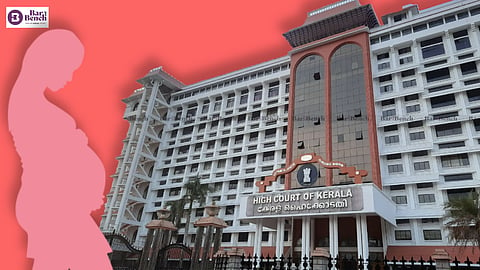
- News
- Columns
- Interviews
- Law Firms
- Apprentice Lawyer
- Legal Jobs
- हिंदी
- ಕನ್ನಡ

The Kerala High Court recently highlighted the importance of ensuring women have the freedom to make choices regarding continuation of their own pregnancies while allowing a woman with mild mental and physical disabilities to terminate her pregnancy (Karthika Sumesh v. State of Kerala)
Single judge Justice PB Suresh Kumar allowed the termination of the pregnancy of a 22-week-old foetus on consideration of a medical report that said that even though the abnormality detected in the foetus might not be life threatening, since the mother has a mild mental disability and impaired adaptive skills, "she might find it difficult to cope with the child-rearing demands of a baby with a disability".
Therefore the Court allowed the termination stating,
"The freedom of a pregnant woman in making a choice as to whether the pregnancy should be continued cannot be taken away. Likewise, the right of the mother to terminate the pregnancy medically even after the permissible period in terms of the provisions of the Medical Termination of Pregnancy Act, has been recognised by the courts, if there is substantial risk that if the child were born, it would suffer from abnormalities as to be seriously handicapped."
Under the Medical Termination of Pregnancy Act, termination of pregnancies are permitted only upto 20 weeks and pregnancies beyond that period can be terminated only if it is necessary to save the life of the pregnant woman.
The Court was hearing a plea moved by the woman and her husband seeking to medically terminate the 22-week-old pregnancy on the ground that continuing with it would pose a risk to the mother's life and the baby would suffer from physical and mental abnormalities.
After an earlier hearing of the case, the Court had directed the Permanent Medical Board constituted at the Medical College Hospital, Kottayam to examine the woman and submit a report as to
whether continuance of her pregnancy would involve a risk to her life or any grave injury to her physical or mental health;
whether there is a substantial risk that if the child were born, it would suffer from any serious physical or mental abnormality.
Subsequently, the Board submitted its report stating that the foetus does suffer from Klinefelter syndrome. It stated that while Klinefelter syndrome is a chromosomal anomaly associated with variable mental subnormality, endocrine problems, and psychological issues in later life, it is not a life threatening disorder.
However the Board also verified that the woman suffers from mild mental retardation, visual disturbances, seizures and weaknesses of the left lower limb with a permanent disability of 55%.
Taking both factors into account the Board recommended medical termination of pregnancy.
The Court concurred by stating, "if the said foetus disorder is analysed in the light of the provision contained in sub-Section(3) of Section 3 of the Medical Termination of Pregnancy Act, 1971, it can be seen that this is a case where it can be held that the continuance of the pregnancy of the petitioner would involve injury to the physical and mental health of the petitioner"
Therefore, it allowed the petitioner to undertake the procedure for termination.
[Read Judgment]